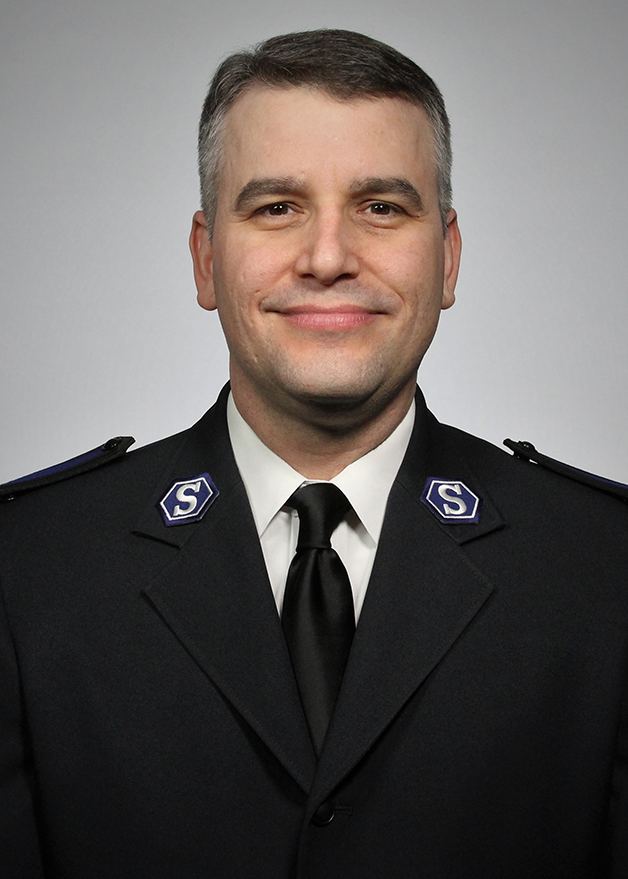10 Questions with Dr. Dale Bannon
"We need to be adaptable and use technology to its greatest benefit."Dale Bannon has twenty years of nonprofit executive leadership experience and currently serves as the National Community Relations and Development Director for The Salvation Army National Headquarters in Alexandria, Virginia.

He has also served as Executive Director and Chief Operating Officer for The Salvation Army National Capital region (Washington, DC), Director of Development for Washington County, Maryland Public Schools, Executive Director for the United Way of Washington County, Maryland, and as a Corps Officer of The Salvation Army in Dallas, Texas, and Lakeland, Florida. Dale Bannon holds a doctoral degree in Executive Leadership from the University of Charleston, West Virginia, where he was named a Dr. George E. Walker Fellow in 2015.
1. How did you meet The Salvation Army?
The Salvation Army Corps Community Center was on the same street where I lived as a child. A friend of mine invited me to join the music program and the corps became a place of grace for me as a child. I came from a broken home due to the divorce of my parents. Finding Christ at a young age was transformational and the corps truly became my second family.
2. What drives you to excel?
Our mission of preaching the Gospel of Jesus Christ and meeting human needs in His name without discrimination drives me every day in this position. It’s a privilege to serve our territories as they equip divisions and local corps and units to bring hope through Christ to so many that are hurting and help for their physical needs. As Commissioner Andy Miller used to ask and answer, “Are we spiritual? Are we social? God has called us to be both!”
3. What are two of your greatest strengths?
I’ve been told that I can be relentlessly persistent and lead with a sense of urgency. I also believe my spiritual gifts are encouragement and teaching.
4. How would you define servant leadership?
Christ was the model servant-leader. He served first and through that service, He led. We are called to model the great commandment, “Love the Lord God with all your heart, and with all your soul and with all your mind and to love your neighbor as yourself.” That’s a great way to look at servant-leadership. We have the privilege to exercise our faith and love of God by serving others. Through Christian service, leadership becomes natural and has purpose—to advance the gospel of Christ. Every day there are opportunities to use our towel and basin and wash one another’s feet. We just have to be open to His leading.
5. What are some of your passions and joys?
The two greatest joys, apart from my walk with Him, is spending time on this Earth with Carol (happily married for 24 years) and with our son, Joshua. God demonstrated his sense of humor when giving me the title of “Dad!” One of the most important responsibilities I have is to model Christ for him. My passions include fishing, camping and I’m a huge fan of the Dallas Cowboys!
6. Who has been an inspiration to you in life and why?
First, my late grandfather, Chester Bannon. He was a WWII vet, civil servant and a big family man. He instilled in me the value of patriotism, hard work and taking care of your family. Without question, he was a part of “the greatest generation.”
The second greatest influence in my life would be Corps Sergeant Major Larry Miller from my home corps of Hagerstown, MD. Larry has always been an inspiration to me. I witnessed him return back to God through an open-air meeting. His life was completely transformed and he became our lay leader as CSM. He was mentor to me as a teenager and still influences my life to this day.
7. How do you handle change and conflict?
Embracing change is critical in my new role as National Community Relations & Development (NCRD) Secretary. We are trying to find new ways to meet the needs of donors such as advancing digital giving programs, such as Kettle Pay. I also have the opportunity to work with amazing professionals as we communicate our brand and message to the public with clarity. Sometimes conflicts arise due to misinformation. Recently, we had an opportunity to address the misinformation about our service to the LGBTQ+ community, driving home that our programs and services are open to all, without discrimination. Capitalizing on opportunities to correct this kind of misinformation has helped amplify our message that we love and serve all.
8. Does being a Christian effect the way you view business?
Absolutely. We are stewards in this world and God expects us to lead with integrity and purpose. As a nation, we are so blessed and through those blessings and to be His hands and feet in a broken world. Part of my job is to promote our brand, Doing the Most Good. This is not just a statement, it’s a promise. When a donor or volunteer gives of their treasure and talent, we promise that we will use that and do the most good by improving lives and communities.
9. What do you see as one challenge for The Salvation Army?
The world is changing at a very rapid pace. Donors have almost unlimited choices of nonprofits to donate to. We need to communicate our message effectively and we need to remind donors that there are still people living in poverty and we have a responsibility to speak for those who are voiceless. We need to tell their stories. We need to be adaptable and use technology to its greatest benefit.
10. Finally, pineapple on pizza? Yay or Nay?
Yay! I’m a huge fan of Canadian pizza!







